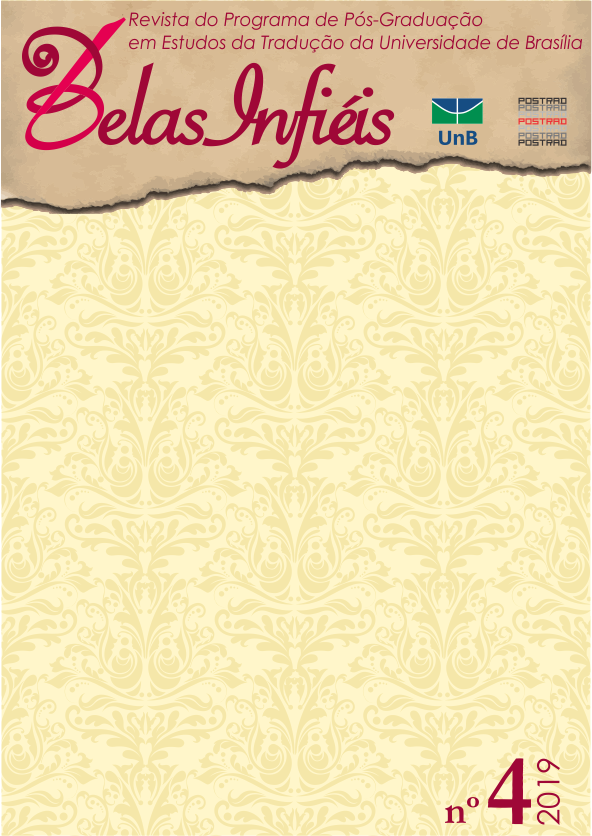A translation of O cágado, a Guimarães Rosa’s poem, into spanish
DOI:
https://doi.org/10.26512/belasinfieis.v8.n4.2019.23856Keywords:
João Guimarães Rosa. Magma. O cágado. Translation. Portuguese/Spanish.Abstract
The relationship between Portuguese and Spanish is at once a factor that facilitates and hinders interlingual translation. Unlike the translation between languages ”‹”‹that are very different from one another, the linguistic transfer between languages ”‹”‹with parenthetical relationship occurs through more recurrent use of direct translation modalities. However, the same proximity that makes the Spanish seem more accessible to the Portuguese-speaking people and Portuguese to the Spanish-speaking people than other languages ”‹”‹imposes traps even to the professional translator, especially if there is no aprioristic decision regarding the approach taken. In order to explore the challenges of literary translation between source languages ”‹”‹and target languages ”‹”‹in principle closely related, this paper proposes a translation, into Spanish, of the poem O cágado, written by the Brazilian João Guimarães Rosa and inserted in the collection Magma, of posthumous publication. Far from arbitrary, the selection of Magma as an object of analysis is justified because it is a book of poems scarcely studied by the critics of this writer from Minas Gerais ”“ better known for his narrative production ”“, besides to coordinate modernist influences with the style properly Rosian and, thus, to anticipate subjects resumed in later works, such as Sagarana and Grande Sertão: Veredas. Considering the peculiarities of the poem, as well as the Rosian writing tout court, we opted for a translation exercise whose primacy rests on the rhythmic element. This theoretical perspective is based on authors specializing in poetic translation, especially Henri Meschonic, who takes up the studies of his predecessors, such as Ezra Pound. In addition to presenting an unpublished translation, we carried out a metatextual exercise of reflection on the main challenges faced in the translation process. The practice of translation, followed by reflection about the very experience of re-creation, showed that the translation from Portuguese into Spanish, especially from a text of the poetic genre, presents syntactic, semantic and pragmatic factors that facilitate the process of translation and others that make it difficult.
Downloads
References
CANDIDO, Antônio. O homem dos avessos. In: CANDIDO, Antônio. Tese e Antítese: ensaios. São Paulo: T.A. Queiroz, 2002. p. 122.
FERRO, Marc. La colonización: una historia global. México D.F.: Siglo XXI, 2000.
GARCÃA DE LA BANDA, Fernando. Traducción de la poesía y traducción poética. III Encuentros complutenses. Madrid: Universidad Complutense de Madrid, 1993.
HARLAND, Michael. Plotino e Jung na obra de Guimarães Rosa. Revista Colóquio/Letras, n. 46, p. 28-35, 11/1978 e n. 49, p. 20-33, 5/1979.
HURTADO ALBIR, Amparo. Traducción y traductología: introducción a la traductología. Madrid: Catédra, 2011.
JUNQUEIRA, Ivan. A poesia é traduzível? Estudos Avançados, v. 26, n. 76, p. 9-14, 2012.
LEONEL, Maria Célia de Moraes. Guimarães Rosa: Magma e gênese da obra. São Paulo: Editora UNESP, 2000.
MESCHONNIC, Henri. Poética do traduzir. Traduzido por: Jerusa Pires Ferreira e Suely Fenerich. São Paulo: Perspectiva, 2010.
MONTES GIRALDO, José Joaquín Otros estudios sobre el español de Colombia. Bogotá: Instituto Caro y Cuervo, 2000.
NORD, Christiane. Texto base-texto meta: Un modelo funcional de análisis pretraslativo. Traduzido e adaptado por: Christiane Nord de Textanalyse und Übersetzen, 2009. Castelló: Servei de Publicacions, 2012.
ROSA, João Guimarães. Grande Sertão: Veredas. In: ROSA, João Guimarães. Ficção Completa. Volume II. São Paulo: Editora Nova Aguilar, 1994.
ROSA, João Guimarães. Magma. Rio de Janeiro: Nova Fronteira, 1997.
ROSA, João Guimarães. Gran Sertón: Veredas. [Edição ao cuidado de Coral Pérez]. Caracas: Fundación Editorial el perro y la rana, 2008.
TORRES, Mario René Rodríguez. Guimarães Rosa e outros escritores provincianos latino-americanos (Arguedas, Rulfo, Roa Bastos e García Márquez). Dissertação (Mestrado em Letras) ”“ Faculdade de Filosofia, Letras e Ciências Humanas, Universidade de São Paulo, São Paulo, 2009. Disponível em: https://www.teses.usp.br/teses/disponiveis/8/8151/tde-20082009-154650/publico/MARIO_RENE_RODRIGUEZ_TORRES.pdf. Acesso em: 4 out. 2019.
ULSH, Jack Lee. From Spanish to Portuguese. Washington, D.C.: Foreign Service Institute, 1971.
VINAY, Jean-Paul.; DARBELNET, Jean. Stylistique comparée du français et de l’anglais: Méthode de traduction. Paris: Didier, 1958.
ZULUAGA OSPINA, Alberto. La función del diminutivo en español. Thesaurus. Tomo XXV, n. 1. Madrid: Centro Virtual Cervantes, 1970.
Downloads
Published
How to Cite
Issue
Section
License
Given the public access to this journal, the texts are free to use but requires the recognition of the original authorship and initial publication in this journal to be properly stated.
 The journal allows the use of works published for non-commercial purposes, including the right to submit the work to publicly accessible databases. Published contributions are the sole and exclusive responsibility of the author(s).Â



















